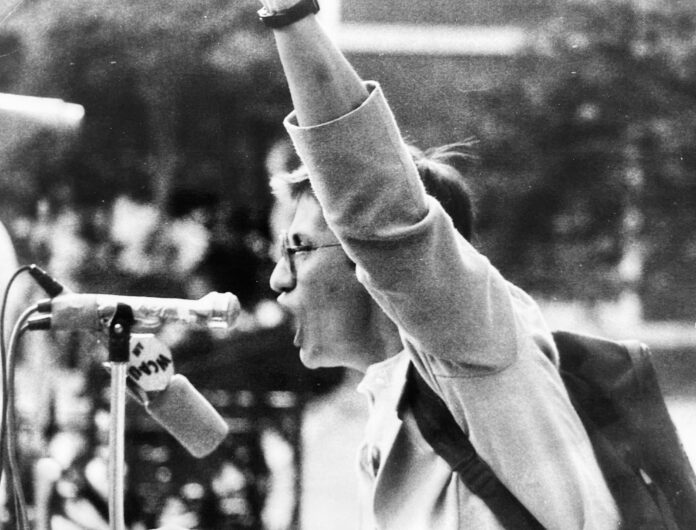Rita Addessa, civil rights activist and the first executive director of the Philadelphia Lesbian and Gay Task Force (PLGTF, later the Pennsylvania Lesbian and Gay Task Force), passed away on July 9, 2022, at Penn Hospice in Philadelphia. “She was a tremendous woman by all accounts – a lesbian feminist supporting all people’s rights,” said Addessa’s son, John Cugini.
A working-class Philadelphian with a disability, Addessa began doing local activism in her late teenage years, around the time she graduated from West Philadelphia Catholic Girls High in 1963. She started working part time for PLGTF in 1978, the year it was founded, and spent 25 years as its executive director beginning in 1979.
“She worked endless hours,” Cugini said. “She had the stamina of 10 people, especially at protests and organizing and getting people out. I couldn’t keep up with my own mother, being a young man.”
The Task Force was located on the University of Pennsylvania’s campus, so its members had access to the school’s professors and thus had quite a few academics on its board, Cugini said. “It was a powerful organization.”
As leader of PLGTF, Addessa and her colleagues spearheaded the campaign that led to the 1982 passage of Philadelphia’s gay rights ordinance, which banned discrimination against gay and lesbian people in housing, employment and public accommodation. Through the Task Force, Addessa created a violence hotline in response to targeted attacks against LGBTQ+ people in Philadelphia at the time, which the PLGTF documented through statistical analysis.
More of Addessa’s work through PLGTF entailed investigating whether local foundations invested in LGBT organizations, and calling out those foundations when she discovered that LGBTQ organizations received virtually no resources from them. Members of PLGTF urged the state District Attorney to recruit and hire LGBTQ assistant district attorneys, made TV advertisements that included queer representation, lobbied the Philadelphia Police Department to implement sexual orientation training and organized rallies and demonstrations in response to anti-LGBTQ laws and policies.
Cugini emphasized Addessa’s tenacity in her activism, “in part possibly because of working class tenacity, and she wasn’t interested in as much compromise,” he said. “Which is often the case with organizations that need funding.”
Addessa and PLGTF also worked to make sure that LGBTQ students had equal rights and inclusive education. She demanded that the Philadelphia School District review and reform its curriculum to require that LGBTQ people be treated fairly and be adequately represented. From there, the School District implemented a policy that required all Philadelphia school teachers to incorporate a curriculum based on concepts of gender equity, as well as culturally and racially diverse teachings.
Addessa did not fight only for the rights of LGBTQ people – she advocated for women, people of color, people with disabilities, people living with HIV, union organizers and other disenfranchised people. “Rita understood that no one is free until we are all free,” Christopher Bartlett, executive director of the William Way LGBT Center, said in a Facebook post.
On Facebook, Bartlett, who worked with Addessa as an activist, shed light on her “difficult” nature, but clarified that “it’s often been said that well-behaved women don’t make history – difficult women do. And Rita Addessa was very difficult.”
“We young activists often laughed at her approach and thought that it made more opponents than friends,” Bartlett said in his post. “Some of us in ACT UP viewed her as old-fashioned. But with the hindsight of many decades involved in Philadelphia’s queer activism, I realize that Rita’s courage, and boldness and the pure difficulty of her nature expanded the envelope of possibilities for all the activism that followed the early work of the Task Force.”
After the Task Force dissolved, Addessa spent years making sure that documentation of its work was well archived and accessible. Most of the archives can be found at Temple University’s Paley Library. Instead of flowers, Cugini said that his mother requested that contributions be made to social and economic justice organizations dedicated to helping impoverished and marginalized people of all races.
